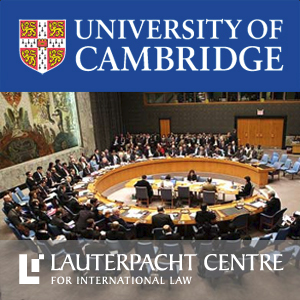'Splendid fragmentation? The emergence of preferential trade agreements and the future of the world economic order' by Professor Peter-Tobias Stoll
Duration: 46 mins 17 secs
Share this media item:
Embed this media item:
Embed this media item:
About this item

| Description: |
The Lauterpacht Centre for International Law (LCIL), University of Cambridge hosts a regular Friday lunchtime lecture series on key areas of International Law. Previous subjects have included UN peacekeeping operations, the advisory jurisdiction of the International Court of Justice, the crime of aggression, whaling, children and military tribunals, and theories and practices for proving individual responsibility criminal responsibility for genocide and crimes against humanity.
This lecture, entitled 'Splendid fragmentation? The emergence of preferential trade agreements and the future of the world economic order', was delivered at the Lauterpacht Centre on Friday 31 January 2014 by Professor Peter-Tobias Stoll, Professor of Public and Public International Law, Georg-August Universitaet Goettingen. Please note, the question and answer sections of LCIL lectures are omitted from the recording to facilitate a free and frank discussion with participants. For more information about the series, please see the LCIL website at www.lcil.cam.ac.uk |
|---|
| Created: | 2014-01-31 15:54 |
|---|---|
| Collection: | LCIL International Law Seminar Series MOVED |
| Publisher: | University of Cambridge |
| Copyright: | University of Cambridge |
| Language: | eng (English) |
| Keywords: | free trade agreements; World Trade Organisation; international law; |
| Abstract: | Particularly after the European Union gave up its reluctance in late 2006 and became active in this regard, a huge number of free trade agreements have been concluded or are negotiated around the world, including some "mega" deals – the Transatlantic Trade and Investment partnership (TTIP) and the Transpacific Partnership (TPP). Such bilateral or regional initiatives are expected to largely benefit the economies at hand and to allow for progress, which has been rather poor in the multilateral setting of the World Trade Organization (WTO) in recent years. However, the agreements also cause concerns. Beyond the many noteworthy details of these agreements, the question arises, what impact these agreements will have in more general terms. The recent discussion on the fragmentation of international law comes to mind in this regard. As had been observed in that context, fragmentation hardly can be understood as a purely accidental phenomenon. In many cases, it is a result of deliberation. Having said this, the further question arises, whether legal considerations or global interest set or should set limits to these new tendencies. An answer to this question requires exploring, whether there is indeed a world economic order and what it means in view of these trade agreements. |
|---|---|

